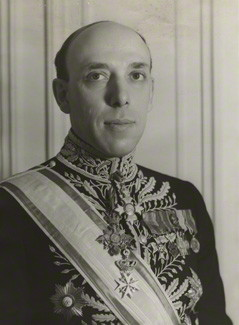Viorel Tilea came from an old noble family in Turda in
Transylvania, was a cousin of Ion Ratiu, and in 1919 attended the
Paris Peace Conference as private secretary to Iuliu
Maniu.
From 1938 to 1940 he was the Romanian Minister in London, was close to the Focus Group (previously the Anti-Nazi Council) of which Churchill was the leading figure, and
changed the course of world history.
On March 16 and 17 1939, two days after the Germans marched
into Prague he told the British Foreign Office and the Foreign Secretary Lord
Halifax that Germany had issued an ‘ultimatum’ to his government.
Bucharest was astonished and denied there had been an ultimatum, but Tilea stuck to his story.
Robert Boothby, who had been Churchill’s Parliamentary Private Secretary, boasted a few days later over lunch with his mistress Lady Dorothy Macmillan, wife of Harold, that he had ‘entirely invented’ the story.
Boothby said he had called on the Romanian legation to obtain a visa, met Tilea who had had mentioned that Germany was asking Romania to concentrate more on agriculture, and he had persuaded Tilea to tell the Foreign Office that this was an ‘ultimatum.’
Boothby had then sold the story to the newspapers.
“According to a German intercept, Tilea admitted to another Balkan diplomat that his instructions had only been to talk of an ‘economic ultimatum’; he had ‘made the utmost possible use of his instructions.’ Whatever the background, he shortly retired a wealthy man; he purchased a farm and maintained a monastic silence until his death. The Foreign Office took note that among Tilea’s effects in January 1941 was a pound of solid gold.” (From David Irving's Churchill's War - please bear in mind that Irving is a very gifted researcher but an admirer of Hitler and not to be trusted very far without checking him. I have not been able to check him.)
The consequence was that Chamberlain decided to give guarantees to Romania and Poland.
This meant that British foreign policy was in effect outsourced to the triumvirate-dictatorship in Warsaw.
Because
Poland would not accept an alliance with Bolshevik Russia, Britain had chosen
Poland over Russia. Indeed Lord Halifax told the cabinet that Poland was
stronger militarily than the USSR.
How differently things might have been had Poland accepted Hitler’s offer of an alliance. In return for the free city of Danzig being incorporated in the Reich and allowing an extraterritorial railway and road across the Polish Corridor, Germany held out the lure of territorial gains in the Ukraine and Belorussia, something very attractive to Poland, even though around 17% of Poland's population were Ukrainian or Belarussian already.
Hitler seemingly was prepared to forget the grievances of Germans in Poland for the sake of a useful ally, as he was those of Germans in the South Tyrol for the sake of Mussolini.
Footnote. Boothby was a curious, flamboyant and not an admirable figure. In the 1960s the notorious East End gangsters the Kray Twins forced
boys to let him bugger them.




The gold habit would have been widespread...
ReplyDeleteThen, I wish I knew better. I hear Borell reminding Westphalia, RFM, the Treaty of Tehran - extempore fit of templates to be done.
A.
Ana, I recognise your prose style but do not understand anything.
DeleteI am surprised I still remember what I had in mind writing on December 3rd [those references were served by each of mentioned parties; I was happy to notice anything that was not a threat]; let it be, I am loosing my mind.
DeleteI don't think giving bars of gold was any more normal in 1939 than now, was it? King Zog in exile that year paid for his entourage's rooms at the Savoy with a periodical bar of bullion taken from the Albanian National Bank.
DeleteI am not assuming it was received in relation with the purported communication. It could have been held in case of further refuge; just about everyone did this [our lot too, common knowledge of unremarkable common practice]. I am unsure what the value might have been, as the quantity is far from clear [I might have a sense of common holdings, give or take].
DeleteExtraordinary
ReplyDeleteOn another hand, yes, I'd say that Romanian diplomacy of back then is the best choice of historical reference now, aside post-war intl law [regarding guarantees of neutrality (to do), and the slightly paradoxical nature of supranational law (to proclaim, as it could not be outright - annoyingly), respectively; these are what I am reading the news for - NATO & Nebenzia...]
ReplyDeleteRomania had no guarantees from Britain, as far as I know. Romania had lost many territories in 1940: half of Transylvania, to Hungary, Basarabia and Bucovina to USSR, Cadrilater to Bulgaria. Did Britain intervene, to defend Romania against these territorial losses?! I don't remember.
ReplyDeleteI am not ungrateful.
Delete